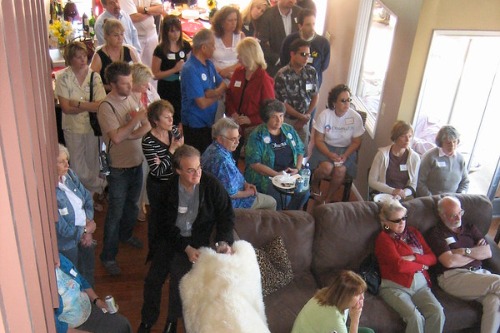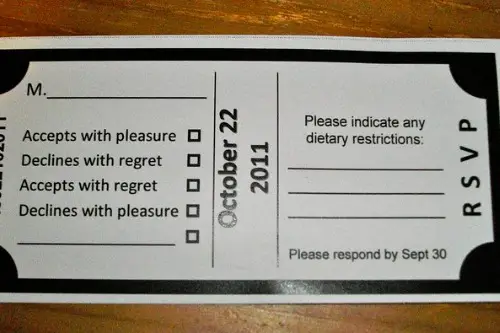1. Letting the Guest List Get Too Big

Over-inviting can turn a cozy dinner into a chaotic mixer where no one really connects. It’s tempting to include “just a few more,” but past a certain point, guests start to feel lost in the crowd. Conversations get shallower, group dynamics shift, and quieter guests can disappear into the background. Instead of deepening bonds, the evening becomes surface-level.
Hosting isn’t about quantity—it’s about quality interaction. A smaller guest list means more meaningful conversations and easier vibes. When people feel seen and heard, they’re more likely to enjoy themselves and return. Sometimes, less really is more.
2. Ignoring Dietary Restrictions

Serving meat to your vegetarian friend “just this once” or forgetting someone’s gluten allergy isn’t just an oversight—it’s a surefire way to make guests feel unwelcome. Dietary restrictions aren’t preferences; they can be cultural, ethical, or even medical. When hosts dismiss or forget them, it signals a lack of care and attention. Over time, people will quietly decline invites rather than risk feeling uncomfortable—or sick.
Planning with dietary needs in mind doesn’t mean creating a custom meal for everyone. It just means having a few thoughtful options and showing guests you remembered. Even a simple “Hey, I got you covered” text can go a long way. Hosting is about making people feel seen, not just fed.
3. Making It All About the “Insta Moment”

If your dinner party feels more like a photoshoot than a hangout, you might be killing the vibe. Constantly adjusting lighting, pausing the meal for content, or staging “candids” can feel performative. Friends come over to connect, not to become extras in your personal brand. When the night feels curated for social media instead of genuine connection, people notice.
While a quick pic or two is fine, your guests shouldn’t feel like props. It can be especially alienating to introverts or people who don’t want their faces online. Being present beats going viral every time. Focus on creating a warm, fun atmosphere—and if a good pic happens, great.
4. Not Introducing People Properly

There’s nothing more awkward than standing silently in a kitchen while everyone else already knows each other. Skipping introductions—or doing rushed, vague ones—leaves guests feeling like outsiders. A thoughtful host connects the dots, maybe mentioning shared interests or fun facts. It sets the tone for smoother, more inclusive socializing.
When you assume people will “just figure it out,” you’re missing a chance to make them feel immediately welcome. A warm, well-paced introduction isn’t hard—it just takes a moment of mindfulness. Think of yourself as the social glue; your effort helps guests bond faster. And when people feel included, they’re way more likely to come back.
5. Forgetting to Offer Non-Alcoholic Options

Not everyone drinks alcohol, and that doesn’t mean they should be stuck with tap water or soda from the back of your fridge. Whether it’s for health, religious, or personal reasons, guests appreciate when they’re considered too. A host who only thinks in terms of wine pairings or cocktail menus risks alienating those who abstain. It can make some feel like an afterthought—or worse, judged.
You don’t need a full mocktail bar, but a few well-chosen options—sparkling water, herbal iced tea, or even a fun zero-proof drink—make a difference. It shows inclusivity and care in your hosting. The message is: “I want you to enjoy this just as much as everyone else.” And that goes a long way in making people feel valued.
6. Talking More Than Listening

Yes, you’re the host—but that doesn’t mean you should dominate every conversation. Guests can feel steamrolled if you’re constantly steering topics, interrupting, or sharing long monologues. When people leave feeling unheard, they remember that more than the wine pairing. A good host invites others in, asks questions, and listens actively.
It’s a balance: your energy sets the mood, but it shouldn’t fill all the space. Conversation should bounce around the room, not orbit you like a spotlight. If people feel like they’re part of the night instead of watching it, they’ll leave feeling more connected. That’s what turns a gathering into a memory.
7. Not Cleaning the Bathroom

It seems small, but it says a lot. A messy or unstocked bathroom (think: no soap, no hand towels, or—worst of all—no toilet paper) makes guests feel like they’ve stumbled into a frat house. It shows a lack of preparation, and it can make even the nicest evening feel gross. People may not say anything, but trust—they notice.
Taking five minutes to tidy up, restock supplies, and maybe light a candle sets a much more welcoming tone. The bathroom is one of the few private places a guest will interact with in your home. If that space feels clean and cared for, the whole night feels more intentional. It’s a tiny detail with outsized impact.
8. Over-Scheduling Every Minute

A tightly packed itinerary might sound like good planning, but it can feel exhausting. When every moment is scheduled—drinks at 7:05, games at 7:45, dessert at 8:10—guests feel like they’re at a corporate retreat. Spontaneity is part of what makes social gatherings enjoyable. People want to catch up, wander into conversations, and go with the flow.
Rigid timelines can make guests anxious about “doing it wrong” or getting left behind. Plus, if something runs over, it can throw off the whole night. It’s great to have a loose structure, but leave room for flexibility. A good host reads the room, not just the schedule.
9. Pushing Guests to Stay Too Long

It’s lovely when people don’t want to leave—but not when they feel like they have to stay. Some hosts don’t pick up on social cues and keep refilling drinks or introducing new activities long after guests are ready to head home. This creates an awkward “exit limbo” where no one wants to be the first to leave. And once people associate your events with overstaying, they may opt out entirely.
Part of being a great host is knowing when to wrap things up. A gentle “last call” or clear wind-down signals gives people permission to head out. Respecting people’s time shows maturity and emotional intelligence. That kind of grace makes guests eager to return—not dread the moment they check their watch.
10. Making Everything About the Food

Yes, good food matters—but hosting isn’t an audition for a cooking show. When the meal becomes the sole focus, it adds pressure and leaves less room for fun. If you’re so busy in the kitchen that you’re not interacting, guests feel like spectators. And if dinner is late or overly complicated, it can derail the whole evening.
A simpler, well-timed menu lets you actually be with your guests. People remember how they felt more than what they ate. Warm conversation and laughter always outshine a perfect soufflé. Host with your heart, not your recipe book.
This post 10 Hosting Habits That Are Quietly Turning Friends Off Your Invite List was first published on Greenhouse Black.
